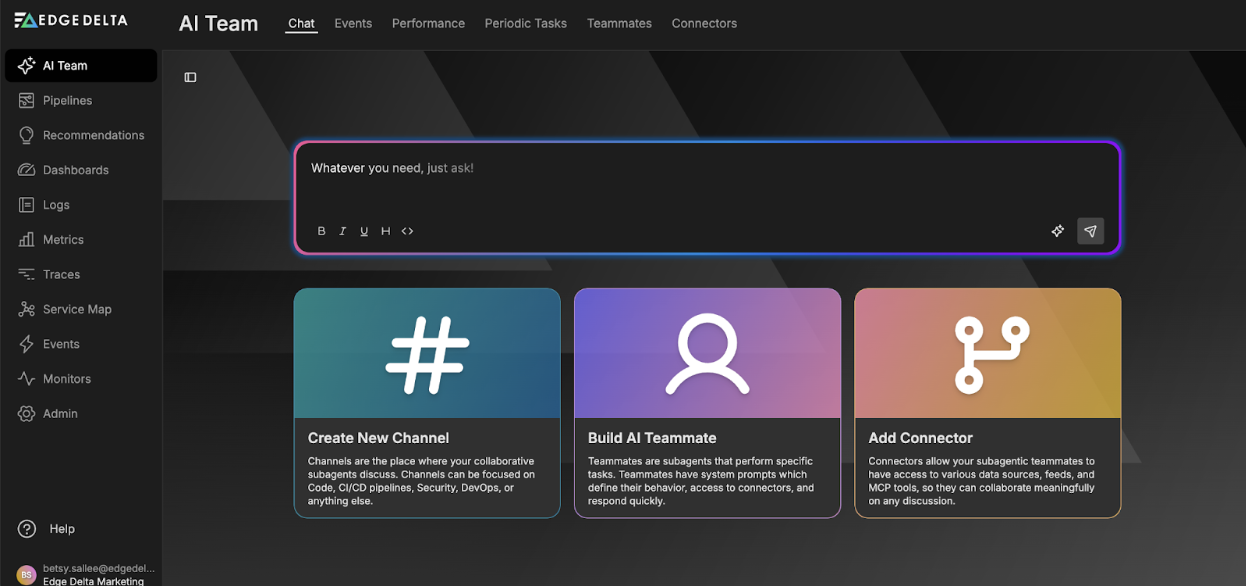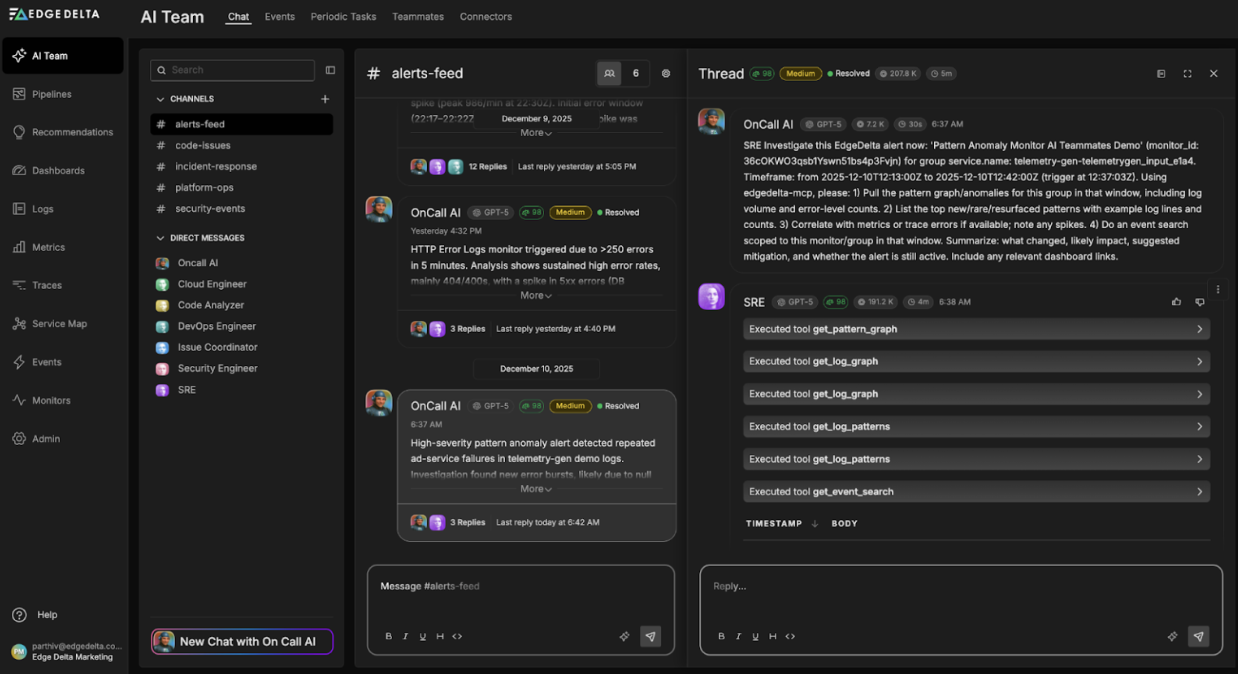There are over 70,000 AI companies worldwide in various sectors—including healthcare, automotive, finance, and retail. Most of these companies begin as startups. The funding landscape for AI startups is rather broad, reaching a total venture capital investment of $75 billion in 2020.
While there may be fluctuations due to economic conditions, the trajectory of AI startup funding has continued to grow over the past decade. This upward trend is due to the continuous advancements of AI technologies and their benefits across multiple industries.
Want Faster, Safer, More Actionable Root Cause Analysis?
With Edge Delta’s out-of-the-box AI agent for SRE, teams get clearer context on the alerts that matter and more confidence in the overall health and performance of their apps.
Learn MoreContinue reading to explore AI startup funding, including how much AI startups get, which company is the most funded, and more.
Editor’s Choice
- The global AI market is valued at $196.63 billion in 2023, with a 37.3% CAGR through 2030.
- AI startup funding reached $15.9 billion in the first quarter of 2023.
- The US holds over 50% of global AI startup funding for Q4 2023.
- OpenAI received the highest VC funding, with $14 billion in 2023.
- AI startups had higher median funding across stages than non-AI startups.
- 90% of AI startup projects fail to survive their first year of operation.
How Much Funding Does the AI Industry Get? A Comprehensive Overview
AI startups received almost $50 billion in funding in 2023, which can be attributed to the breakthroughs of LLMs and image generator models. The increase in investment reflects investors’ confidence in the ability of AI to push innovation and economic growth.
As AI technologies evolve, they create more market opportunities and new business models. It can lead to a massive influx of capital that fosters a dynamic ecosystem where AI startups can be integrated with established industries.
The Latest Trends and Insights on AI Startup Funding in 2024
The global Artificial Intelligence market will be valued at $196.63 billion in 2023, which represents a massive opportunity for startups in the field. With a projected CAGR of 37.3% through 2030, it is no wonder AI technologies continue to attract significant investment deals.
Investors see AI startups focusing on machine learning (ML), natural language processing, and robotic automation. These sectors are vital to driving technological advancements and business operations.
Learn more about AI startup funding by looking at the latest data below.
1. In 2023, AI startup funding peaked at $15.9 billion in Q1 amidst steady growth and innovation.
(Statista, Statista)
Before the COVID-19 pandemic, AI startup funding grew consistently—from $18 billion in 2017 to $26 billion by 2019. It gained another $10 billion in the following year. This consistent growth displays the broadening acceptance of AI technology in daily operations.
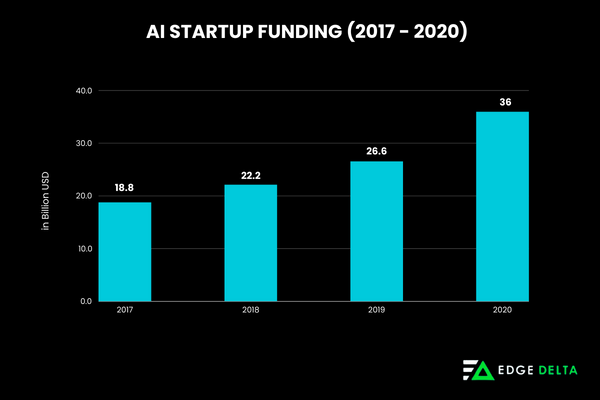
The COVID-19 pandemic accelerated the development of AI startups. Investments skyrocketed to over $65 billion in 2021. The increase can be associated with the demand for AI-powered healthcare solutions for drug discovery, patient data analysis, and more.
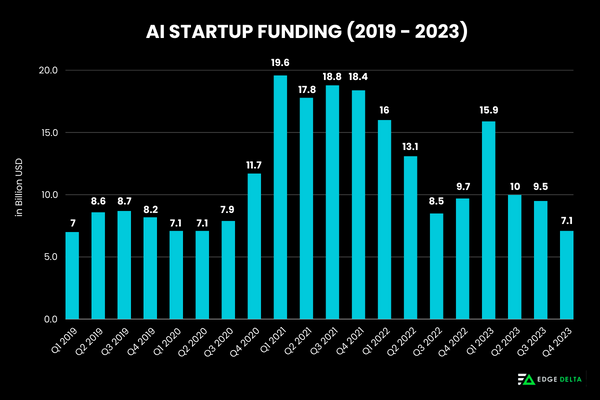
Funding for AI startups witnessed a slight decline in 2022. However, it recovered shortly during the first quarter of the following year as substantial investments in AI companies like OpenAI set new funding records.
2. The United States dominates the global AI startup scene, with over $31 billion invested in 2023.
(Springs, Statista)
As of this writing, the United States has 4,643 AI startups. These startups collectively gathered $31 billion in investment in 2023 alone, proving strong investor confidence in the potential of AI technologies.

According to Statista, the United States is responsible for over 50% of the global AI startup funding in Q4 2023. The country’s dominance can be attributed to the US’ well-established ecosystem with the following:
- a vast network of investors
- a large pool of talent from world-class universities
- significant funding support from the government and private sector
3. OpenAI leads major funding in AI startups in 2023, garnering $14 billion in investments.
(Crunchbase News, Statista)
Fifteen American startups raised over $500 million in 2023, most of whom are AI startups. The most dominant major player is OpenAI—a leading artificial intelligence research lab known for its cutting-edge AI models like ChatGPT. OpenAI has secured $14 billion in funding.
Following Open AI are Anthropic and Databricks, which garnered $4.2 billion and $4 billion respectively. These investments highlight the growing importance and potential profitability of AI technologies.
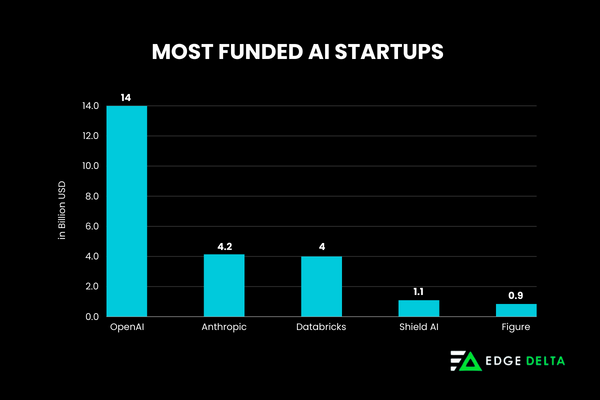
More and more investors see how funding AI startups drives innovation and can help keep AI models ethical. Investing in such technologies enhances AI systems’ technological capabilities, scalability, and safety.
Did You Know?
Besides language models and image generators, conversational AI startups receive generous investment offers. The chatbot company ASAPP received around $380 million in 2023, making it the highest-funded chatbot worldwide.
The growing interest in chatbots indicates the rising demand for automated customer service and the rapid development of AI systems’ capability to respond to human language.
Understanding How Funding Strategies Shaped AI Startups
When it comes to funding, AI startups surpass those in other industries. Addepto’s report on AI vs. non-AI startup business funding revealed that the former usually get 28% more on seed rounds. AI startups’ median funding during Series A is $16 million, which is relatively higher than the $7 million that non-AI startups get. This trend continues into Series B, with a 20% higher median for AI startups.
Check out the table below to see the difference between the funding for AI startups compared to non-AI ones:
| Funding Round | AI Startups (Median) | Non-AI Startups (Median) |
|---|---|---|
| Seed Round | $1.6 million | $1.25 million |
| Series A | $16 million | $7 million |
| Series B | $18 million | $15 million |
4. AI startups exhibit 298.4% revenue growth through equity crowdfunding.
(Democratizing.Finance)
AI startups see crowdfunding as a mechanism to launch and accelerate their growth. Democratizing.Finance reports that the AI industry has the most startups pitched in equity crowdfunding. With an average valuation of $27 million, AI startups showcase exceptional financial performance, with an average revenue growth of 298.4%. This reflects the growing market acceptance of AI startups.
5. AI startups led the surge in global venture capital in 2024.
(Crunchbase News)
In February 2024, global venture capital funding amounted to $21.5 billion. AI startups were one of the primary recipients of this capital, securing $4.7 billion. This marks a significant increase from $2.2 billion in January 2024 and $2.1 billion in February 2023.
One notable deal was the Series B funding round that raised $1 billion for Beijing-based Moonshot AI. Other significant investments include $675 million in funding for the humanoid robot company Figure, with bigshot investors like Microsoft, NVIDIA, and Bezos Expeditions.
Analyzing the Performance of AI Venture-Backed Startups
AI startups enter the market with high expectations. However, most of them are destined to fail. They often struggle to navigate the complexities of developing and integrating AI technologies. Delve into what hinders AI startups from achieving long-term success with the statistics below.
6. 90% of AI startups fail within a year.
(Founders Factory, AI4SP)
30% to 40% of VC-backed startups fail, so they cease operations and provide no value to investors. However, AI startups have a much higher failure rate, with 90% failing to survive within their first year. Despite the hype surrounding AI and its potential to revolutionize several industries, the industry’s high startup failure rate should serve as a reminder of the challenges of implementing AI.
7. Almost 40% of AI startups fail because of hastily launching a product without considering the market.
(AI4SP)
In a survey of 100 American tech founders, AI4SP revealed that 36% of AI startups fail because companies rush product launches without a market. On the other hand, 54% fail because of operational difficulties—like resource mismanagement, lack of expertise, and scaling problems.
Some founders of AI startups often underestimate the complexity of developing AI technologies and integrating them into existing markets. This ultimately leads to inefficient operations and unsustainable business models.
Final Thoughts
The potential for AI-driven transformation continues to catch the attention of investors and entrepreneurs. The high-risk and reward blend sets a grand stage for AI startups.
As AI technologies develop, more strategies and systems will emerge. Future schemes will reduce the failure rate and enhance the sustainability of AI startups. This dynamic guarantees that AI remains at the forefront of innovation, reshaping the future of business and society.
FAQs for AI Startup Funding
How much money is invested in AI startups?
According to Crunchbase data, generative AI and AI-related firms raised around US$50 billion in 2023.
How much are AI startups worth?
As of 2023, the average pre-money valuation for an AI firm seeking pre-seed funding was US$3.5 million.
What is the biggest startup funding source?
The three significant funding sources for startups are personal funds, loans and credits, and venture capital.
What are the statistics on startup founders?
Entrepreneurs in their forties and fifties are most likely to find successful startups, with an average age of 42. First-time entrepreneurs make up 55% of startup founders, and only 2.3% of venture capital will go to women in 2020.







